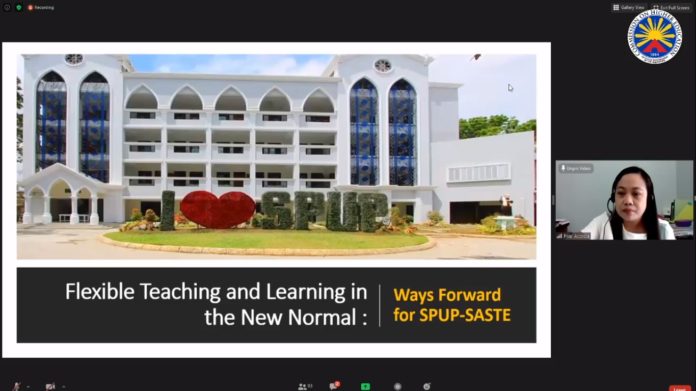The Teacher Education Council (TEC R02) in collaboration with the Commission on Higher Education (CHED R02) sponsored a webinar via zoom on the Journey of Centers of Excellence (COEs) and Centers of Development (CODs) in Teacher Education of Higher Education Institutions in Region 02 last July 14, 2020.
Dr. Pilar Acorda, Dean of SASTE and SHS A Coordinator talked on Flexible Teaching and Learning in the New Normal: Ways Forward for SPUP-SASTE.
She shared the department’s experiences during the ECQ-GCQ period until the present. According to her, setting contingency measures and procedures in the delivery of classes during these times is very crucial. These include the protocols for the teaching-learning process, instructional delivery, monitoring and evaluation.
“As part of SPUP’s post-ECQ Learning Continuity Plan, the faculty in the department has to explore on various ways on how to adopt to the Flexible Learning Modalities”, she added. Hence, to ensure that learning continues despite the pandemic and the work from home arrangements, the extent of instructional delivery during the ECQ was strictly monitored.
Dr. Acorda said that to close the current semester, the department has employed various platforms and modalities. The platforms include Edmodo, Google Classroom, Schoology, and the like. Modalities varied depending on the strength of internet connectivity of both teachers and students. The faculty utilized synchronous and asynchronous means, eClasses, eMeetings, eThesis Consultation and eDefense, eFinal Demonstrations, eMonitoring Reports, and eSurveys among others.
“Apart from online webinars and trainings on flexible learning, there are on-going institutional trainings to capacitate, upskill and re-skill teachers ready for AY 2020-2021. Also, an ongoing research on the Readiness of Teachers and Students to Flexible Learning is being conducted. Results of this research will be used as basis in formulating the Learning Continuity Plan of the department”, she added.
Dr. Acorda said that the department’s Learning Continuity Plan will primarily consider the flexible learning modalities for lecture courses, laboratory courses, internship/practicum/field study courses vis-à-vis internet connectivity of both teachers and students, and digital transformation initiatives.
She concluded that, “The challenges of the new normal is indeed tough. Championing e-learning is tougher. This is our challenge, together we can make it.”









